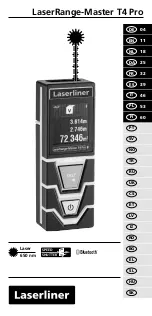
Instruction Manual
FT 1K
FT_SO-BA-e-1111
2
SAUTER GmbH
Tieringerstr. 11-15, D-72336 Balingen
Tel: +49 (0) 7433 9976 174
www.sauter.eu
The metrology features of the instrument and any possible
available adjusting weight must be checked at regular
intervals within the scope of quality assurance. For this
purpose, the answerable user must define a suitable
interval as well as the nature and scope of this check.
Information is available on
the home page (
www.KERN-sohn.com
) with regard to the
monitoring of instrument test substances and the test
weights required for this. Test weights and instruments can
be adjusted quickly and at a reasonable price in KERN’s
accredited DKD calibration laboratory (return to national
normal).
3. Fundamental safety information
Do not use the hanging instrument to transport loads.
Prevent jolts, torsion and oscillation (e.g. by appending
slopingly) of all kinds.
Never use the hanging instrument over the maximum
permitted weight (!!Danger of breaking!!).
Always make sure that there are no living beings or
materials below the load that could be injured or damaged.
The hanging electronic instruments from the SAUTER
instrument are only suitable for hand-held use or use in a
test stand.
They are not suitable for hanging from a mechanical hook,
e.g. a crane hook.
3.1 Observe the information in the operating instructions
Please read the operating instructions carefully before
erecting
and commissioning, even if you already have experience
with SAUTER instruments.
3.2 Staff training
The device may only be operated and looked after by
trained members of staff.
4. Transport and storage
4.1 Acceptance check
Please check the packaging immediately upon delivery
and the device during unpacking for any visible signs of
external damage.
4.2 Packaging
Please retain all parts of the original packaging in case it
should be necessary to return items at any time. Only the
original packaging should be used for return
consignments.
Before despatch, disconnect all attached cables and
loose/movable parts. Apply any
intended transport security
devices. Secure all parts, e.g. glass windshield, measuring
plate,
power unit etc., to prevent slipping and damage.
5. Unpacking, installation and commissioning
5.1 Place of installation, place of use
The instrument is constructed in such a way that reliable
measuring results can be achieved under normal
application conditions.
By selecting the correct application location for your
instrument, you will be able to work quickly and precisely.
Therefore please observe the following at the application
location:
• Avoid extreme heat as well as temperature fluctuation
caused by installing next to a radiator or in the direct
sunlight;
• Protect the instrument against direct draughts due to
open
windows and doors;
• Avoid jarring during measuring;
• Protect the instrument against high humidity, vapours
and dust;
• Do not expose the device to extreme dampness for
longer
periods of time. Inadmissible bedewing (condensation of
air
moisture on the device) can occur if a cold device is taken
into a significantly warmer environment. In this case,
please acclimatise the device for approx. 2 hours at room
temperature after it has been disconnected from the
batterys.
• Avoid static charging of the material to be measured,
measuring container and windshield.
Major display deviations (incorrect measuring results) are
possible if electromagnetic fields occur as well as due to
static
charging and instable power supply. It is then necessary to
change the location.
5.2 Unpacking
Carefully remove the instrument from its packaging,
remove the plastic wrapping and position the instrument in
its intended working
location.
3. Working
Conditions
10°C to 30°C / 15% up to 80% humidity
4. Power
Supply
6 x 1.5 V AA, UM-3 Batteries
If batteries are low, display showes „Lo“





















